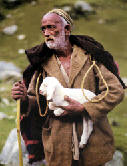(Psalms 24) A Psalm of
David. The earth is the LORD'S, and the fulness thereof; the
world, and they that dwell therein. {2} For he hath founded it
upon the seas, and established it upon the floods. {3} Who shall
ascend into the hill of the LORD? or who shall stand in his holy
place? {4} He that hath clean hands, and a pure heart; who hath
not lifted up his soul unto vanity, nor sworn deceitfully. {5} He
shall receive the blessing from the LORD, and righteousness from
the God of his salvation. {6} This is the generation of them that
seek him, that seek thy face, O Jacob. Selah.
It seems like an odd idea
that it is impossible to keep Godís law when this kind of
exhortation is so common in the Bible. The truth is that the Law can
be kept in any of its parts. It is the whole law that is the
problem. The law describes life and life is complicated. Thatís why
a Savior is needed.
{7} Lift up your heads, O ye gates; and be ye lift up, ye
everlasting doors; and the King of glory shall come in. {8} Who is
this King of glory? The LORD strong and mighty, the LORD mighty in
battle. {9} Lift up your heads, O ye gates; even lift them up, ye
everlasting doors; and the King of glory shall come in. {10} Who
is this King of glory? The LORD of hosts, he is the King of glory.
Selah.
Commentators attribute this psalm to David, returning the Ark to
Jerusalem. The opening of the gates to let the Ark come in is
compared opening the everlasting doors to receive the Messiah.
There is a curious variant in the NIV on this last verse. Here
and elsewhere the NIV alone renders "Lord of Hosts," as "Lord
Almighty." I donít know if this is a textual variation or not, but
this seems to be the way the NIV renders YHWH Tsaba
everywhere. |
